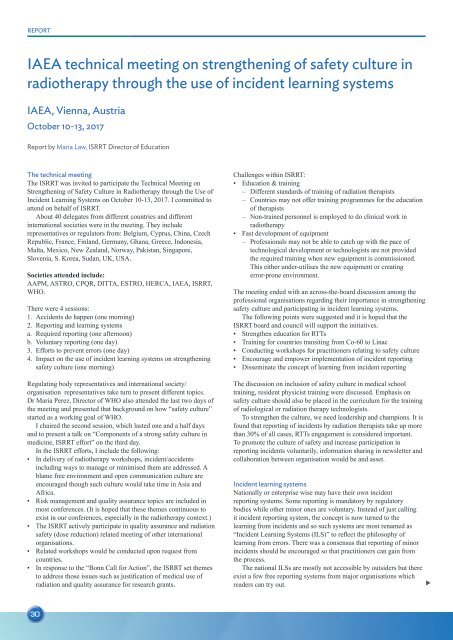ISRRT-DEC-2017_WEB
You also want an ePaper? Increase the reach of your titles
YUMPU automatically turns print PDFs into web optimized ePapers that Google loves.
REPORT<br />
IAEA technical meeting on strengthening of safety culture in<br />
radiotherapy through the use of incident learning systems<br />
IAEA, Vienna, Austria<br />
October 10-13, <strong>2017</strong><br />
Report by Maria Law, <strong>ISRRT</strong> Director of Education<br />
The technical meeting<br />
The <strong>ISRRT</strong> was invited to participate the Technical Meeting on<br />
Strengthening of Safety Culture in Radiotherapy through the Use of<br />
Incident Learning Systems on October 10-13, <strong>2017</strong>. I committed to<br />
attend on behalf of <strong>ISRRT</strong>.<br />
About 40 delegates from different countries and different<br />
international societies were in the meeting. They include<br />
representatives or regulators from: Belgium, Cyprus, China, Czech<br />
Republic, France, Finland, Germany, Ghana, Greece, Indonesia,<br />
Malta, Mexico, New Zealand, Norway, Pakistan, Singapore,<br />
Slovenia, S. Korea, Sudan, UK, USA.<br />
Societies attended include:<br />
AAPM, ASTRO, CPQR, DITTA, ESTRO, HERCA, IAEA, <strong>ISRRT</strong>,<br />
WHO.<br />
There were 4 sessions:<br />
1. Accidents do happen (one morning)<br />
2. Reporting and learning systems<br />
a. Required reporting (one afternoon)<br />
b. Voluntary reporting (one day)<br />
3. Efforts to prevent errors (one day)<br />
4. Impact on the use of incident learning systems on strengthening<br />
safety culture (one morning)<br />
Regulating body representatives and international society/<br />
organisation representatives take turn to present different topics.<br />
Dr Maria Perez, Director of WHO also attended the last two days of<br />
the meeting and presented that background on how “safety culture”<br />
started as a working goal of WHO.<br />
I chaired the second session, which lasted one and a half days<br />
and to present a talk on “Components of a strong safety culture in<br />
medicine, <strong>ISRRT</strong> effort” on the third day.<br />
In the <strong>ISRRT</strong> efforts, I include the following:<br />
• In delivery of radiotherapy workshops, incident/accidents<br />
including ways to manage or minimised them are addressed. A<br />
blame free environment and open communication culture are<br />
encouraged though such culture would take time in Asia and<br />
Africa.<br />
• Risk management and quality assurance topics are included in<br />
most conferences. (It is hoped that these themes continuous to<br />
exist in our conferences, especially in the radiotherapy context.)<br />
• The <strong>ISRRT</strong> actively participate in quality assurance and radiation<br />
safety (dose reduction) related meeting of other international<br />
organisations.<br />
• Related workshops would be conducted upon request from<br />
countries.<br />
• In response to the “Bonn Call for Action”, the <strong>ISRRT</strong> set themes<br />
to address those issues such as justification of medical use of<br />
radiation and quality assurance for research grants.<br />
Challenges within <strong>ISRRT</strong>:<br />
• Education & training<br />
– Different standards of training of radiation therapists<br />
– Countries may not offer training programmes for the education<br />
of therapists<br />
– Non-trained personnel is employed to do clinical work in<br />
radiotherapy<br />
• Fast development of equipment<br />
– Professionals may not be able to catch up with the pace of<br />
technological development or technologists are not provided<br />
the required training when new equipment is commissioned.<br />
This either under-utilises the new equipment or creating<br />
error-prone environment.<br />
The meeting ended with an across-the-board discussion among the<br />
professional organisations regarding their importance in strengthening<br />
safety culture and participating in incident learning systems.<br />
The following points were suggested and it is hoped that the<br />
<strong>ISRRT</strong> board and council will support the initiatives.<br />
• Strengthen education for RTTs<br />
• Training for countries transiting from Co-60 to Linac<br />
• Conducting workshops for practitioners relating to safety culture<br />
• Encourage and empower implementation of incident reporting<br />
• Disseminate the concept of learning from incident reporting<br />
The discussion on inclusion of safety culture in medical school<br />
training, resident physicist training were discussed. Emphasis on<br />
safety culture should also be placed in the curriculum for the training<br />
of radiological or radiation therapy technologists.<br />
To strengthen the culture, we need leadership and champions. It is<br />
found that reporting of incidents by radiation therapists take up more<br />
than 30% of all cases, RTTs engagement is considered important.<br />
To promote the culture of safety and increase participation in<br />
reporting incidents voluntarily, information sharing in newsletter and<br />
collaboration between organisation would be and asset.<br />
Incident learning systems<br />
Nationally or enterprise wise may have their own incident<br />
reporting systems. Some reporting is mandatory by regulatory<br />
bodies while other minor ones are voluntary. Instead of just calling<br />
it incident reporting system, the concept is now turned to the<br />
learning from incidents and so such systems are most renamed as<br />
“Incident Learning Systems (ILS)” to reflect the philosophy of<br />
learning from errors. There was a consensus that reporting of minor<br />
incidents should be encouraged so that practitioners can gain from<br />
the process.<br />
The national ILSs are mostly not accessible by outsiders but there<br />
exist a few free reporting systems from major organisations which<br />
readers can try out.<br />
u<br />
30



